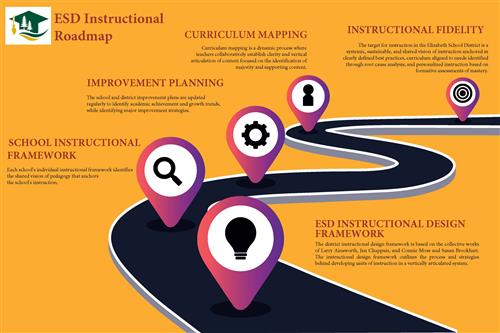Curriculum and Instruction
Page Navigation
Department of Curriculum and Instruction
-
The vision of the Elizabeth Department of Curriculum and Instruction, as demonstrated by the ESD Instructional Roadmap is to establish a systemic, sustainable, and shared vision of instruction anchored in clearly defined best practices, curriculum aligned to needs identified through root cause analysis, and personalized instruction based on formative assessments of mastery.

Guiding our work implementing the vision for instruction in Elizabeth School District are the District Instructional Design Framework, School Instructional Frameworks, Curriculum Maps, and Assessments of Learning.
- The District Instructional Design Framework is anchored in the work of renowned educational researchers Lary Ainsworth (Rigorous Curriculum Design), Jan Chappuis (Seven Strategies of Assessment for Learning), and Connie Moss and Susan Brookhart (Learning Targets). The District Instructional Design Framework provides clarity and guidance on how instructional staff collaborate to develop units of instruction.
- School Instructional Frameworks are developed by the instructional experts at each individual site to establish a shared understanding of the instructional pedagogy and strategies of focus at each individual site. School Instructional Frameworks are aligned to school improvement plans, are collaboratively developed, and focus on the following indicators: Collaboratively Developed, Standards Alignment, Assessment for Learning, Educational Environment, Differentiation, and Data-Based Needs. School Instructional Frameworks are embedded within the District Instructional Design Framework.
Clarity of Language - It is important to ensure there is clarity and a common understanding of important aspects of this work. Specifically, the difference between "Standards" and "Curriculum." As the Colorado Department of Education outlines (Click for Standards vs Curriculum Outline):
- Standards are broad learning goals articulating what students should know, understand, and be able to do over a given time.
- A curriculum is an organized plan of instruction comprised of a sequence of instructional units that engages students in mastering the standards. Resources such as instructional materials and textbooks are supports for the curriculum.
Colorado Academic Standards
The Colorado Academic Standards are intended to be a reflection of instructional priorities valued by Coloradans and provide a road map to help ensure students are successful in college, careers, and life. However, it is the district's analysis of student educational needs as demonstrated in performance assessments, along with the interpretation of the academic standards that are outlined in district-generated curriculum maps that facilitate teaching through clearly defined units of instruction.
Colorado Academic Standards
-
Comprehensive Health Standards
The last comprehensive Health Standards revision was in 2018.
Changes
Colorado Comprehensive Health Standards by Grade Band:
-
Computer Science Standards
The Computer Science Standards were first adopted in 2018.
Changes
-
Dance Standards
-
Drama and Theatre Arts Standards
The Drama and Theatre Arts Standards were first adopted in 2018, and last revised in 2022.
Changes
-
Mathematics Standards
The last Mathematics Standards revision was in 2018.
Changes
Colorado Mathematics Standards by Grade Band:
-
Music Standards
The Music Standards were first adopted in 2018 and last revised in 2022.
Changes
-
Physical Education Standards
The Physical Education Standards were first adopted in 2018.
Changes
-
Reading, Writing, and Communicating Standards (Language Arts)
The Reading, Writing, and Communicating Standards were adopted in 2018 and replaced the Language Arts Standards.
Changes
Colorado Reading, Writing, and Communicating Standards by Grade Band:
-
Science Standards
The last Science Standards revision was in 2018 when Next Generation Science Standards (NGSS) were adopted in Colorado.
Changes
Colorado Science Standards by Grade Band:
-
Social Studies Standards
The last Social Studies revision was adopted in 2022.
Changes
-
Visual Arts Standards
The Visual Arts Standards were first adopted in 2018 and last revised in 2022.
Changes
-
World Languages Standards
The World Languages Standards were first adopted in 2018.
Changes
-
Elizabeth School District Initiatives
- Profile of a Graduate
- Career Exploration (overview)
Post-Secondary Workforce Readiness
Board policies related to curriculum and instruction
- Curriculum Development
- Early Literacy and Reading Comprehension
- Early Literacy and Reading Comprehension Assessments
- Exemptions from Required Instruction
- Graduation Requirements
- Grading/Assessment Systems
- Grading/Assessment Systems - Regulation
- Health Education
- Instructional Resources and Materials
- Teaching about Controversial Issues and Use of Controversial Materials
-
Department Members
Kim Moore
Chief Academic OfficerDr. Kimberly Seefried
Director of Special ServicesJennifer Bruns
Gifted and Talented Coordinator


